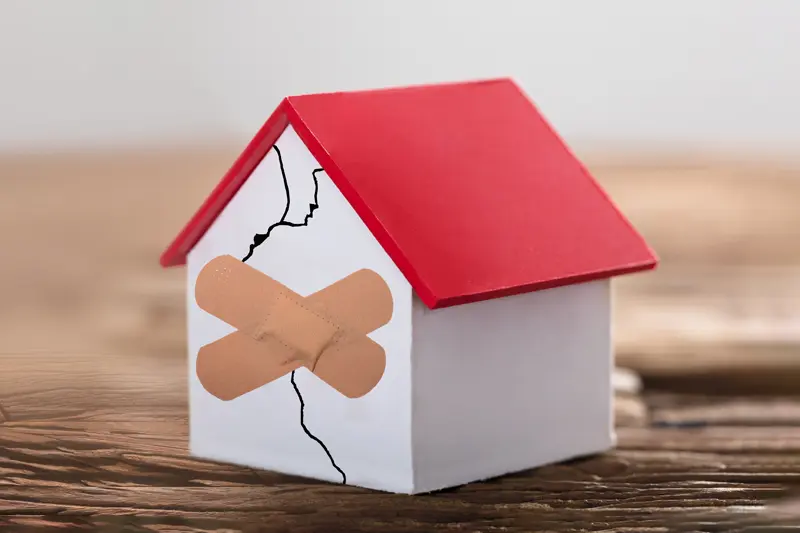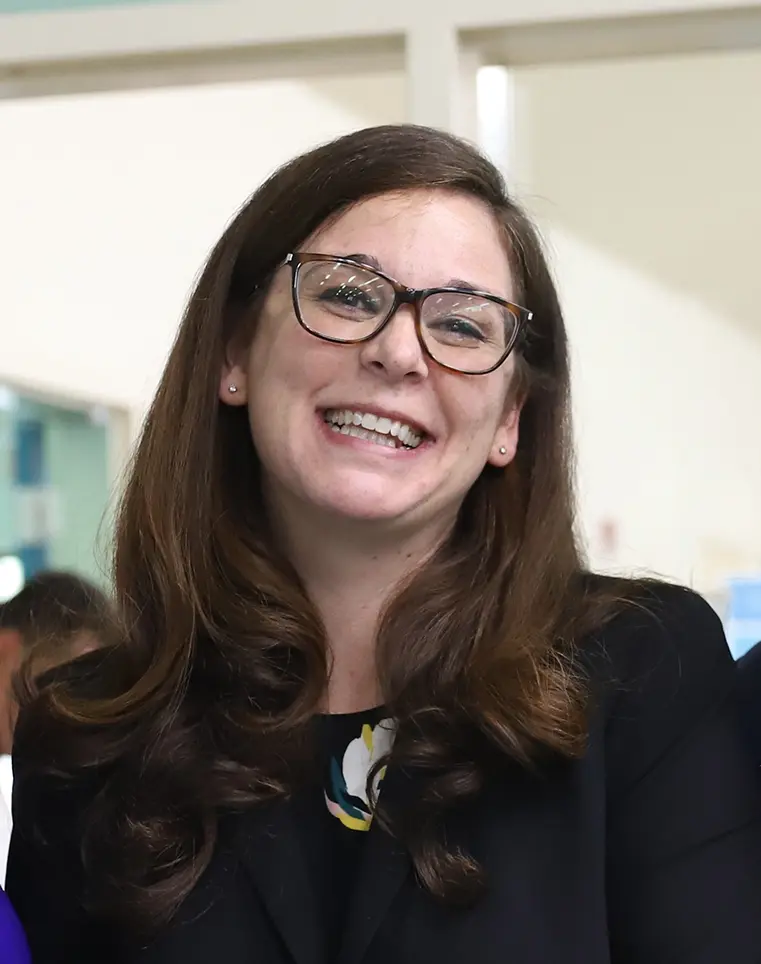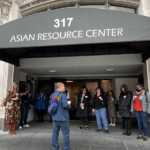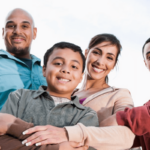Search
This is the Work!
July 31, 2023

A conversation with Kelly Batson on Values, Adapting, and Creating Lasting Impact

As the Chief Community Impact Officer, and a driving force behind United Way Bay Area’s mission, Kelly Batson’s dedication to creating lasting change in the Bay Area is inspiring. In this engaging conversation, she shares her vision for a more equitable Bay Area and the impactful initiatives UWBA is undertaking to achieve that goal. Join us as we delve into Kelly’s unique perspective and unwavering commitment to fighting poverty in the region and making a positive impact in our communities.
For those who prefer to read, a full transcript of the interview is provided below. We encourage you to spread the word and share this enriching discussion with friends, colleagues, and anyone passionate about creating a better Bay Area.
And if you want to hear more conversations like this, don’t forget to subscribe to our newsletter for updates.
In Convo: Kelly Batson on Values and Lasting Impact
United Way Bay Area’s Chief Community Impact Officer, Kelly Batson, stops by to discuss values, how we adapt, and creating a lasting impact.
Transcript
So I guess I pose that to you. Like, why are we still…
Batson
Why can’t we fix this? Yeah.
UWBA (JM)
I mean, I understand the need is there, but, like, why… Or have we made headway? And I know that we have the pandemic right now, and that’s probably exasperating things. But I think even removing that, we’re still dealing with rates of poverty that seem to be spiraling. I’m curious, after a hundred years, after us doing this, what do you think? Where do you think we stand?
Batson
I mean, so yeah, I was trying to think about, you know, in my I asked you if I could just say it was racism and capitalism… and colonization like I could probably get like whatever that looks like. But I, I mean, I think that’s true. But like, that’s not enough. Something I thought of when I was just in the last 10 minutes realizing we were going to talk about this.
I was like, Wait, why do I think that? And something I’m taking this training, the woman that does this training, she’s done like worldwide trainings like with the U.N. around leadership. And she said something in the first day of training that says a system delivers according to its values. And so I just felt like, what system did we build?
Right, and who benefits from it and who doesn’t? And so this and I know and we’ve said this in many ways, right, like policy or poverty is a policy choice or, you know, like we are making the choice for it to work this way and it’s working the way we wanted it to. Right. Or that we built it to we don’t want it to anymore.
So I’ve been thinking a lot about that since that training in October because I just feel like, Oh yeah, this is and I think about it and all the little micro systems that we have to just how my team operates or how we, you know, the United Way operates or all of those things like we’re going to deliver according to our values.
So I think if we think about all the systems that people live at, whether that’s like the very big system like capitalism or how people access resources and benefits, right? So if we put we have this a system for people to access, you know, maybe some like public benefits, people have to prove that they’re in crisis and people have to, you know, and that’s part of I know the ambassador said that in the in the guaranteed basic income convening like people are proving having to prove they’re in crisis, you can’t have any savings.
You can’t… Right? Like it’s really not meant to help someone be successful. It’s really meant to keep someone dependent . We built that by thinking people don’t have autonomy or agency or people don’t, you know, aren’t trying. We’re not building it with the mobility that we really want people to have in mind. So I just feel like every system is going to do that.
And we built this system in that way and all and and all the different levels. Right? So I think that’s at the core of it. And there’s been moments I think we made gains generally in like 100 years. We make gains when we change the system to really value the contribution of all versus the people in power. And so the more power we can distribute, the better off we’re going to be.
UWBA (JM)
Mm hmm. Yeah.
Batson
I think those are when we have gains and really solving poverty is when we value the contribution of everyone, understanding that we haven’t really prioritized making sure that wages for the lowest income folks are going up. So then people just continue to have to struggle to afford to, you know, as costs go up, they’re not able to meet.
That was something that occurred to me of as one of the key pieces to that. This has always supposed to be this social movement. So that the X Factor or like what was going to make this systems change was going to be public policy. And I think that’s really where you get that. You know, in our mission where we talk about dismantling the root causes it, a lot of it is the capital P policy like actual legislation.
But also like I said, maybe like your public benefits system and the and like procedural changes for policy, not, you know, like how we how we do those types of services and supports for families who are currently struggling. I think it’s changing both of those policies. But this other key part that really was sort of fascinating to me that I do think might be a really promising way to think about it is this social movement idea when the majority of community realizes that, that their fate is tied together, that we all have a role to play and we really have to be you have to be actively pushing against it and fighting against poverty.
Kind of like when everybody realized that tobacco was bad for you. And so it just kind of became this norm that you’re like, this is not acceptable. We can’t just let tobacco companies, you know, sell to our kids. And even though that’s still happening and that are still you know, we have lots of impacts from that still. But there is this idea that if we had a social movement big enough for everyone to recognize poverty is no longer acceptable, what would that look like?
And I think that is partly why we’re still here. Like we haven’t tip the scale of people doing something differently. Maybe they know conceptually and, you know, sort of intellectually that that’s it’s not that’s not a good thing. And they don’t want that. And they don’t want people to hurt like that. But are they doing something about it right?
Because it’s not going to be United Way doing this alone. Yeah, right. So that’s it. Yeah, it’s a it has to be a movement, not just a thing that, you know, a handful of us work on for years and years. So.
UWBA (JM)
Well, that’s that’s interesting. And I, I kind of want to play a little bit of devil’s advocate then because, you know, even even with your example of like tobacco, right?
Batson
Mm hmm.
UWBA (JM)
Tobacco is still doing it, right?
Batson
Right…
UWBA (JM)
Yeah. You know, like, yeah. Like I and I think maybe even most recently, I know that we voted to not allow the sale of flavored tobacco in California. Right. So that is arguably that’s a win. That’s a step forward. But that’s just happening now as opposed to like how how many years is that that taken?
And we’re still operating in a system, you know, to your point, a system that is designed to still ultimately kind of benefit big tobacco. And so I guess what I what I wonder then is like poverty is not a new issue in the Bay Area. And, you know, maybe it takes on slightly different forms over the over the decades, but it’s not it’s not new.
And so this social movement that we’re talking about, I mean, do we just not realize that we see that that our fates are that tied. Is there an inherent, like the way that the system of the Bay Area is designed specifically, leads to an inherent feeling that, “yeah, that’s bad and maybe that it is a drag on the system in some areas, but it doesn’t really affect me as long as I’m not seeing it.
And then when I see it, it affects me because I have to see it.”
Batson
Right where the pandemic has to happen. And now I’m like, Oh crap. All the people who were struggling, like, who were frontline essential workers are the ones struggling the most and getting caught with the most and in the hospital the most and dying the most.
UWBA (JM)
And right.
Batson
Yeah, you’re right. I mean, you’re right. And maybe one I think it’s not a good enough excuse or whatever to say. These things take time. But it struck me like who who is in the movement around tobacco, right? Is it? And tobacco is a heart. I mean, it’s not you know, it’s not apples to apples. But I’m just thinking like I wonder if it’s who is part of that movement?
Does that make a difference? It’s yeah, it’s the people in power, but it’s the people who want to regain their power and the people with lived experiences. Like if that started a movement, would that look different then? Like waiting for the people at the top to realize we can’t, you know, we shouldn’t let people smoke this much or have they or whatever, you know, we should put in place.
So I don’t know. That’s just sort of what struck me when you’re asking the question. But I don’t have a good answer for that. As a society. We haven’t decided that the system should have different values yet, right? Like people want more money, people want more things. People want more power. They think it’s a0a0 sum game, right?
If I have to give something, if other people win, I have someone has to lose and that is. Yeah.
UWBA (JM)
Well, but that’s capitalism, right?
Batson
Right. So you know, that is not about capitalism.
And that and that is how our system works right now. Right? Yeah. Like that doesn’t have to be true. Like I say, it’s not a zero-sum game, but it is. Yeah. Right now until like if we had a different value around that, could we actually change? Would we still would we have a different system and would the movement move faster or would it be like a snowball?
That really is a radical way to think about it.
UWBA (JM)
And what does that look like to you? Radical transformation in a perfect world, what does that look like? Yeah.
Batson
It’s really about centering community first and having that drive us instead of us driving it. And I don’t know if that’s that radical. There’s so many organizations that do that kind of work. I do think there’s more value in the part where we partner with others. We do nothing alone, we do everything in partnership. And I think that that is key, right?
It’s not just about starting your nonprofit to serve this one need. It’s looking around and seeing who has the strengths and the assets and what can you add? Let’s look around and see what’s happening and see how we can be helpful. We don’t have to start a new thing. We don’t have to take all the credit. We just need.
We just want the impact to happen. So how do we do that? I think there’s a lot of values where like we we plug in to places. And so I think more partnership and collaboration, but with more intention. It was more like strategic thinking about what parts of the system can we have impact on that might make a change so that we’re not doing this 100 years from now?
UWBA (JM)
I mean, like, how are we addressing those the root causes and what are those? We say root causes a lot. But I wonder in your view, like like what are some of those? I mean, I know you said like “racism!” Yeah. You know, but really, how does that play into the system where it directly affects poverty?
And then how do we actually intend on addressing that? Because racism is big, right? Right. That’s a big.
Batson
Yeah.
UWBA (JM)
How are we going to like cure that?
Batson
Yeah. I mean, in terms of the how, it’s probably policy and advocacy work. You know, like if you think about how obviously I think housing feels like a really tangible way to talk about what some of these like root causes in terms of like racism and capitalism and what those did to marginalized people. So having some people build wealth, have some people not building wealth.
So that feels like a policy solution, right? So you get and then that takes so much time. And again, I think the work there is this social movement, public will building. Right. That’s the same kind of work, right? Getting everyone to understand how this is a community problem, not someone else’s problem and what the impacts are when we say, you can’t be in my backyard and you got to be somewhere else, what that looks like in terms of other root causes of poverty, I think about the free tax help program and how, you know, essentially it’s about getting money into the pockets of the people who need it.
And that’s at the margins saying here’s the people that have a lot of money and the people that don’t and let’s just redistribute that. Right. So but does that address is that dismantling the root cause of why there’s people with a lot of wealth and why there’s people without that? But it is redistributing it, right? So it’s kind of on the edges of it.
So I also think about what SparkPoint does. And you know, the connection between financial stability and education. It’s kind of our buckets, right? So if you think of housing and basic needs and career and financial stability like those are kind of the drivers. And each of those have like 50 reasons why they don’t the systems don’t work like they’re supposed to.
So it’s very hard to articulate this in a way that is like succinct and says, here’s the three or four things we’re doing to dismantle it. The three or four things we’re doing to help people live through it. Like, what can we do to just help you get through it right now? Understanding it, we got to change the big system for the long term.
But you just need you just need support right now.
UWBA (JM)
Well, no, I mean, to your point, I think like that’s the root causes are down mixed in with all of those reasons like yes. Like, you know, wages need to be better, but also like cost of living has to be controlled in some kind of way. Yes, we all need we need more housing, but also the cost of building housing is like going crazy for a number of reasons, because we also need that housing to be good housing and sustainable and not just like somebody’s going to shed somewhere and say, Yeah, and ultimately after all of that, it comes down to at least with housing, right?
Like there’s just not there’s not enough of it. So my question is, when you get down to those things like how are we addressing those, we can help people in college, that that that helps. That’s probably an investment in the future. But it doesn’t necessarily ensure that their wages are going to be better once they get out.
I don’t know. I’m just I’m like.
Batson
So what are we going to do if we’re still here and we want this not to not be true?
UWBA (JM)
Yeah.
Batson
So I think that is something that the United Way could do. And I think that’s partly why it’s good for us to be amplifying these messages and sharing what we know about what’s happening in community. And I think that’s key. And I think that’s why people said to us, help us tell people that we need to do something about this and that they can take action or they can get involved, or that here’s the here’s the real problem with housing.
I think people think we have an audience that maybe others don’t. So I think that’s a key component. And that feels small and it doesn’t feel it. Obviously, it’s not enough, but I think that’s a place to start. I think we have to be on the same page about what the problem is, but I think that is the work like this is that like I keep thinking like you do where you know you’re going to end in two months, you’re going to have this thing and you’re like, okay, now I’m really doing that work of dismantling the root causes of poverty.
Know this is you are doing it by having these conversations and by speaking truth. Write about what the issues are and having, you know, people discover it and understand it better and that is the work. It’s not it’s not somebody else that’s doing some fancy thing that feels really impossible. It’s it’s every day. So I don’t know. I think about that a lot in terms of if we want to put ourselves out of business, that might be where we have to start.
And, you know, and in terms of public policy, that hasn’t always been you know, I think nonprofits generally so I think we’re not alone in this just recently are more like, yeah, that’s the work. I could be running the shelter until the end of time, right? I have to change the whole thing. So yeah, I think that those the maybe it’s education, information sharing and it’s an unwavering focus on on policy.
Right. Not giving up when it feels like that could go by the wayside. It can’t. That is the that is the work that has to continue and is at the core.


